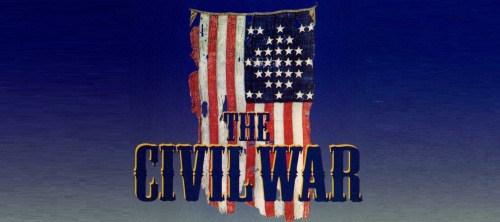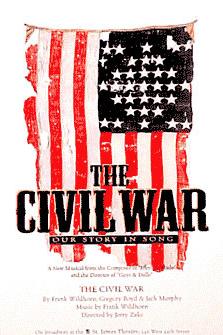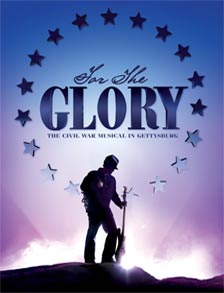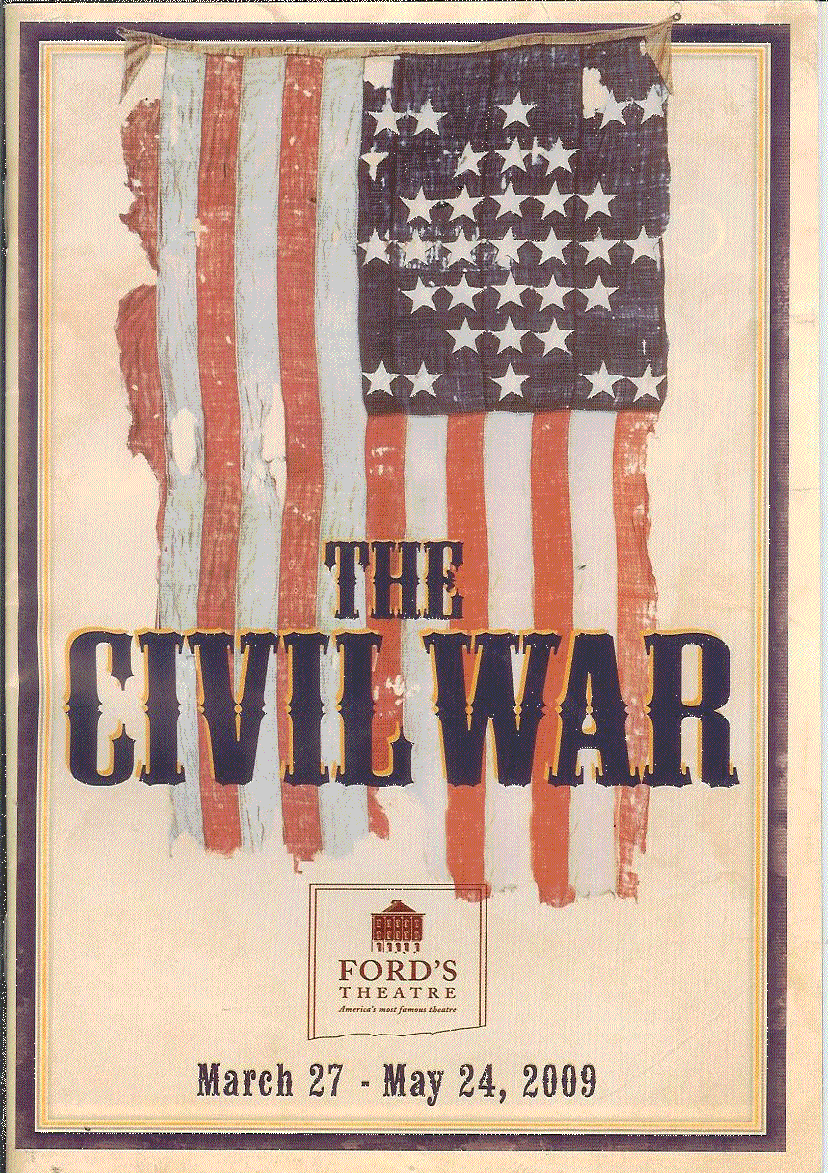
"Lorsque l’homme s’habitue à voir les autres porter les chaînes de l’esclavage, c’est qu’il accepte lui-même un jour de les porter." Abraham Lincoln
Ce musical ne peut être résumé, puisqu'il est une suite de chansons autour d'un thème : la guerre de Sécession.
Acte I
A young girl stands before an American flag, facing the audience, dressed as if ready to attend Church on a Sunday morning. The voices of contemporary children are heard, reciting the Pledge of Allegiance. The cast enters and takes their places around the young girl. The American flag changes to the flag as it was in 1859.
The actors step into character: Union Soldiers, Confederates, Slaves and Civilians. The image of the flag rips apart, as men from the North and the South form into battle lines. Emmet Lochran sings of the coming conflict (Brother, My Brother), and after a moment of indecision, joins the Union army.
On the eve of the First Battle of Bull Run, young recruits from both the North and the South shout war slogans and mock their opponents (By the Sword/Sons of Dixie) They boast of their strength and envision the glory the battle will bring them.
The scene changes to the aftermath of the battle. One of the Northern infantry-men, Nathaniel Taylor, lies near death. Horatio Taylor sits away from his dying brother, cradling his rifle. Lochran observes. Nathaniel's spirit sings to his brother to Tell My Father" that "his son/ didn't run or surrender" and "wore the blue/ proud and true like he taught me". Nathaniel is taken to a place upstage by the Young Girl, where he (and the other characters who die during the course of the play) observe the proceedings.
A slave family is silhouetted against the image of the ruined flag. A chained figure leaves their midst; he removes his chains and iron collar and puts on a cut-back swallow-tail dress coat, transforming into the elegant figure of Frederick Douglass.
The voices of two politicians debate slavery's importance to the survival of the Union. Douglass steps forward, and brandishes a copy of the Declaration of Independence. He trumpets the words of the Declaration: "We hold these truths to be self evident, that all men are created equal". He exhorts his followers to demand freedom, and to pray to be Freedom's Child.
McEwen's wife, Sarah, writes a letter to him from their Minnesota farm. She tells him how she is learning to run the farm alone, but confesses she is still Missing You (My Bill).
The slaves are thrown into the spectacle of a slave auction on a Savannah wharf. The Auctioneer sells off a young black man who stands, head bowed, following the Auctioneer's barked commands. A tableau of a plantation house on a wide green lawn is juxtaposed with the scene of the slave auction. The Slaves sing of the ordeal of being sold as merchandise, separated from those they love, and of the terrible life they endured on the plantations. Frederick Douglass prays that "the Lord God send/ all his wrath down upon what he knows isn't right. (The Peculiar Institution).
A man and a woman, sold on the auction block and soon to be separated, sing of their devotion to one another and their desperate longing for freedom (If Prayin' Were Horses).
Pierce, a captain in the Confederate Army, sings of his homeland, Virginia. He dreams of the planatation of his youth and wonders if the way of life he has known has gone forever.
On a country road, we see Autolycus Fell, a businessman-con artist-thief, accompanied by three feathered and corseted ladies: Mabel, Violet, and Portia. He instructs the ladies that where there is marching military, there is money, and the only thing that matters in the midst of war is the almighty Greenback. Fell displays the women to some passing Union soldiers, offering them some 'horizontal refreshment'. The soldiers pay no attention. Fell then reveals to Pierce and the Confederates what he has seen of the Union troop movements.
The captains of the opposing sides, Pierce and Lochran, confront their thoughts on the eve of battle. They are observed by Nathaniel Taylor, the dead soldier. (Judgement Day). They each pray, asking for God's mercy for sending men to their deaths in battle. As the sun rises, Lochran and Pierce think of all the letters they have written to mothers whose sons have died in battle and the faces of all the soldiers they have lost.
In a Military Field Hospital, a Nurse moves among the Confederate wounded calming and reassuring the injured soldiers. She tells us how she talked with a young soldier, sick with dysentery and typhoid fever, who spoke with her and asked her to read to him from the Bible. He told her he did not fear death, and he dies as she tries to comfort him. Hanna Ropes, a nurse in the Union Hospital, laments that I Never Knew His Name, an elegy for all the wounded men who meet their end in the make-shift hospitals which often seem to be little more than warehouses for the dying.
Frederick Douglas appears again, proclaiming that it is "better to die free, than live as slaves." A gravedigger laments, wondering Father How Long? until he can sing freedom's song. On the plantation, the slaves loose their chains, and sing a gospel anthem of the freedom that awaits them on the banks of "The River Jordan."
Acte II
The soldiers sing of Judgement Day (Reprise) in the darkness. A single soldier, Stewart, a private in the Confederate Army, studies the area. He realizes that he has never really looked at the countryside around him, the land that is his home. Even as he longs to linger, he knows that I'll Never Pass This Way Again.
The Confederates trudge forward through the winter rains. (How Many Devils Time passes on endlessly as they march. The exhausted soldiers wonder if the war they thought would be so easy to win will ever come to an end. Winter turns to a blazing summer as the Union soldiers pick up the song. Their strength is ebbing, and they dream of home, knowing all the while they are likely never to return there. Another battle ensues; some of the soldiers are killed. The survivors regroup and start marching again through the rain. The two armies are exhausted, dispirited and numb; they seem to blend into one group, marching endlessly.
Abraham Lincoln sits alone in the White House in the winter of 1862. Late into the night, he wrestles with his thoughts. (Candle in the Window)
On the road to battle, Autolycus Fell hawks his concoction Oh Be Joyful -- a mixture of "bark juice, tar-water, turpentine, brown sugar, lamp oil and alcohol". He sells it to the weary soldiers who gratefully gulp it down to escape their troubles. Lochran, their Captain, appears and seems ready to put an end to the revelry. To everyone's surprise, he takes a swig of the stuff and joins in with his troops.
The sound of artillery is heard. As time stands still, a wounded Confederate soldier sings the thoughts that run through his mind in the instant between being under fire and the moment he is struck by the bullet. (The Day the Sun Stood Still) He describes the endless sea of soldiers who converge in a mass of blue and gray, under a sun that seemed to blaze for days on end. The soldier, who has been struck by gunfire, goes to take his place among the dead.
Lincoln appears, reading a condolence telegram to the mother of five sons who have died in battle. He admits that mere words cannot assuage such an overwhelming loss, but asks her to take comfort in the fact that her sons died to save the Republic. The mother, Mrs. Bixby, sings of her Five Boys. She still hears them and sees them "playing in a field with angels."
Slaves surround Sojourner Truth as she preaches outside a rural barn. She tells them of the freedom that God has promised them: "gonna break these chains and walk the walk/ gonna free the sparrow from the hawk". (Someday)
McEwan and Sarah receive letters from each other. He tells her that the Union Army crossed the Potomac into Virginia, where one of their men was killed by sharpshooters. In his pocket, the man had a letter from a girl, which reminds him to write every day how powerfully he misses his Sarah. Now a ghost, he sings to her that he must leave but he will always be watching her from above. She receives a black-bordered condolence telegram; she vows she will struggle on to raise their son and survive in the midst of tragedy for The Honor of Your Name.
Near a Confederate camp, Autolycus Fell rifles through the clothes of the dead soldiers, scooping up small change and paper money in Greenback (Reprise). He addresses the corpses, claiming that the money will do them no good anymore.
A full moon illuminates a river: on one side Lochran, the Union captain, and on the other Stevens, the Confederate sentinel. At first they taunt one another, but soon they are talking of the simple realities of their situations: comparing bullet wounds and bad rations. Speaking to one another simply as men, not as enemies, Stevens realizes that "We could solve this war in thirty minutes, if they left it to us."
Lochran pulls out a letter from his wife. He tells her of his meeting with the young Confederate sentinel: "We were both scared/ As two men can be". He hangs on to the thought that only thirty days remain until he can return to her aboard a Northbound Train.
Gettysburg, Pennsylvania, July 2, 1863. The two armies are massed, waiting for dawn to break on the second day of the battle. The Confederate soldiers sing The Last Waltz for Dixie, knowing the fate of the South hangs on the moment at hand. The slaves reprise The River Jordan, as the sun rises on a wall of mist and the two armies face each other.
The Union soldiers train their guns on the Confedrate line, hidden by the fog. Lochran stands apart, calling on his soldiers to give their utmost for The Glory. Pierce emerges with his men, knowing "the time to stand has come at last.../ the bridge is burned, the dye is cast." The battle commences, fog and smoke cover the stage, revealing only battle flags and bayonets. As the rebel soldiers advance, Lochran fires his cannon; he is killed in the explosion.
The earthen floor of the stage is now blood red. The bodies of slain men fill the stage to the horizon. There is stillness. An angel descends, a familiar figure from the artwork of the period. The dead rise to meet her. She sings to them as the image changes to a green, unbloodied field. The company stands and faces the audience, singing "for the truth we hold so dear/ Let us give the last full measure gathered here/ For the glory."
A new adaptation of The Civil War, titled For The Glory: The Civil War Musical at Gettysburg, was specially prepared for the newly restored Majestic Theater in Gettysburg, Pennsylvania.
"Civil War" n'a pas un livret traditionnel de musical mais prend plutôt une forme libre qui donne toute liberté à Frank Wildhorn pour exprimer son talent. Le spectacle rerend des lettres, des journaux, dex documents historiques et la poésie de Walt Whitman avec pour seul fil rouge l'exploration de cette "Civil War", que nous francophone appelons la guerre de Sécession, qui a coûté la vie à 620.000 Américains. On suit ainis les événements depuis le début de la guerre à Fort Sumpter jusqu'à sa conclusion sanglante. "Civil War" ne se concentre pas seulement sur les questions de l'unité de la nation et de l'abolition d'esclavage, mais aussi sur l'impact de la guerre sur les familles. Le musical comprend de magnifiques chansons comme "Sons of Dixie" où de jeunes recrues, s'attendant à une victoire rapide, rêvent de défilés de victoire en leur honneur et de l'admiration des femmes dont il va résulter. Une autre merveille est "Tell My Father" dans laquelle un soldat mort s'adresse à son frère qui combat dans le camps opposé. Sans oublier "Judgement Day" où deux capitaines se demandent sils font une chose juste…
1 Civil War (The) s'intéresse à un événement historique important: Guerre de Sécession américaine.
The project for THE CIVIL WAR began in 1995. Frank Wildhorn and Gregory Boyd had just put together the national tour of JEKYLL & HYDE. The Alley Theatre, which premiered the show before it's Broadway run, was preparing to celebrate it's 50th Anniversary. The team wanted to create a new piece to commemorate. Jack Murphy signed on to collaborate and the unusual structure of THE CIVIL WAR was born.
With this new project, the team wanted to create an untraditonal 'thematic' musical event with a distinctively American voice and with an emphasis on traditional story-telling. THE CIVIL WAR is a musical event borrowing techniques from rock music, concert performance, oratorios and song-cycles. It wasn't structured with conventional narrative, but rather as an emotional landscape grounded in universal feelings as expressed by the people who lived this extraordinary event. The writers were inspired by the words of Walt Whitman, Frederick Douglass and Abraham Lincoln. They were also inspired by the life (as documented through letters, photographs, and journals) of the real Hannah Ropes, Mary Chestnut, 2nd Virginia Infantryman Henry Kyd Douglas, and Henry H. Pearson of the 6th New Hampshire company.
A studio cast album was released in 1999 by Atlantic Records, and included Linda Eder, Maya Angelou, James Garner, Hootie & the Blowfish, Travis Tritt, Dr. John, and Betty Buckley. The musical had its world premiere at the Alley Theatre, Houston, Texas, on September 16, 1998, where co-author Boyd is the Artistic Director. The production was supervised by Gregory Boyd, with musical staging by George Faison and staging by Nick Corley. The cast featured Linda Eder (Hanna Hopes), Beth Leavel (Mrs. Lydia Bixby/Violet), Jesse Lenat (Autolycus Fell), Capathia Jenkins (Hope Jackson), Matt Bogart (Pvt. Nathaniel Taylor) and Michael Lanning (Capt. Emmet Lochran).
The musical premiered on Broadway at the St. James Theatre on April 22, 1999 and closed on June 13, 1999, running for 61 performances and 35 previews. Directed by Jerry Zaks with musical staging by Luis Perez, the cast featured Leavel as Mabel/Mrs. Bixby, Bogart as Private Sam Taylor, and Leo Burmester as Autolycus Fell.
The musical toured in the United States, starting in January 2000 in Cincinnati, Ohio. The original cast of 28 had been reduced to 15. "Rather than playing individual characters, they all play everyman - a soldier, a wife, a nurse, a girlfriend, a slave." Stephen Rayne directed, with a cast that included Larry Gatlin alternating with John Schneider, and BeBe Winans.
The Civil War was one of the productions produced at the newly-renovated Ford's Theatre (Washington, DC), running from March 27, 2009 through May 24. Directed by Jeff Calhoun, the 16-member cast featured Jarrod Emick, Eleasha Gamble, Michael Lanning, and Timothy Shew, with the recorded voice of Hal Holbrook as Lincoln. The production is conceived in a concert setting.
In 2006, a new version of the musical opened at the Majestic Theatre in Gettysburg, Pennsylvania. Called For the Glory: The Civil War Musical in Gettysburg, it featured two new songs and a new structure.
Acte I
A House Divided – The Citizens
Freedom's Child – Frederick Douglass and Abolitionists
By The Sword / Sons of Dixie – The Armies
Tell My Father – Private Sam Taylor
The Peculiar Institution – The Enslaved
If Prayin' Were Horses – Clayton Toler and Bessie Toler
Greenback – Autolycus Fell, Mabel and Violet
Missing You (My Bill) – Sarah McEwen
Judgment Day – Captain Billy Pierce, Captain Emmett Lochran, Private Sam Taylor and The Armies
Father, How Long? – Clayton Toler
Someday – Harriet Jackson, Bessie Toler and Others
I'll Never Pass This Way Again – Corporal Henry Stewart
How Many Devils? – The Armies
Acte II
Virginia – Captain Billy Pierce
Candle in the Window – Harriet Jackson
Oh! Be Joyful! – Autolycus Fell, Sergeant Byron Richardson, Private Conrad Bock and Private Elmore Hotchkiss
The Hospital – Mrs. Bixby, Nurse, Union Soldiers and Clayton Toler
If Prayin' Were Horses (Reprise) – Clayton Toler and Bessie Toler
River Jordan – Benjamin Reynolds and Others
Sarah – Corporal William McEwen
The Honor of Your Name – Sarah McEwen
Greenback (Reprise) – Autolycus Fell and Violet
Northbound Train – Captain Emmett Lochran
Last Waltz for Dixie – Captain Billy Pierce and Confederate Soldiers
The Glory – Captain Emmett Lochran, Frederick Douglass, Benjamin Reynolds and Full Company
Aucun dossier informatif complémentaire concernant Civil War (The)
Aucun dossier informatif complémentaire concernant Civil War (The)

Version 1
Civil War (The) (1988-09-Alley Theatre-Houston) Pre Bway Try Out
Type de série: Pre-Broasway Try OutThéâtre: Alley Theatre (Houston - Etats-Unis) Durée : 10 ans 1 mois 2 semaines Nombre : Première Preview : 16 September 1988
Première: 16 September 1988
Dernière: 01 November 1998Mise en scène : Nick Corley • Chorégraphie : George Faison • Producteur : Star(s) : Avec: Sarah McEwen … Irene Molloy
Hannah Ropes … Linda Eder
Mrs. Lydia Bixby/Violet … Beth Leavel
Autolycus Fell … Jesse Lenat
Mabel … Hope Harris
Young Girl … Armani Greer & Deandrea Yowman
Clayton Toler … Michel Bell
Benjamin Reynolds … Lawrence Clayton
Frederick Douglass … Keith Byron Kirk
Exter Thomas … Wayne Pretlow
Bessie Toler … Cheryl Freeman
Hope Jackson … Capathia Jenkins
Liza Hughes … Cassandra White
Emmet Lochran … Michael Lanning
William McEwen … Gilles Chiasson
Nathaniel Taylor … Matt Bogart
Horatio Taylor … Ron Sharpe
Charles Spencer … Bart Shatto
Byron Richardson … Royal Reed
Bartholomew Patrick Anderson … David Bryant
Billy Pierce … Gene Miller
Henry Stewart … David Lutken
Darius Barksdale … Kim Strauss
Virgil Franklin … Dave Clemmons
Cyrus Stevens … Jim Price
Sam Welles … John Sawyer
John Beauregard … Timothy Browning

Version 2
Civil War (The) (1999-02-Shubert Theatre-New Haven) Pre Bway Try Out
Type de série: Pre-Broadway Try OutThéâtre: Shubert Theatre (New Heaven - Etats-Unis) Durée : 2 semaines Nombre : Première Preview : 16 February 1999
Première: 16 February 1999
Dernière: 07 March 1999Mise en scène : Nick Corley • Chorégraphie : George Faison • Producteur : Star(s) :

Version 3
Civil War (The) (1999-04-St James Theatre-Broadway)
Type de série: OriginalThéâtre: St. James Theatre (Broadway - Etats-Unis) Durée : 1 mois 3 semaines Nombre : 35 previews - 61 représentationsPremière Preview : 23 March 1999
Première: 22 April 1999
Dernière: 13 June 1999Mise en scène : Jerry Zaks • Chorégraphie : Luis Perez • Producteur : Star(s) : Avec: Capt. Emmett Lochran … Michael Lanning
Sgt. Patrick Anderson … Rod Weber
Sgt. Byron Richardson … Royal Reed
Capt. William McEwen … Gilles Chiasson
Pvt. Conrad Bock … Ron Sharpe
Pvt. Elmore Hotchkiss … Bart Shatto
Pvt. Nathaniel Taylor … John Sawyer
Capt. Billy Pierce … Gene Miller
Sgt. Virgil Franklin … Dave Clemmons
Cpl. John Beauregard … Mike Eldred
Cpl. Henry Stewart … David M. Lutken
Pvt. Darius Barksdale … Anthony Galde
Pvt. Cyrus Stevens … Jim Price
Pvt. Sam Taylor … Matt Bogart
Frederick Douglass … Keith Byron Kirk
Clayton Toler … Michel Bell
Bessie Toler … Cheryl Freeman
Benjamin Reynolds … Lawrence Clayton
Exter Thomas … Wayne W. Pretlow
Harriet Jackson … Capathia Jenkins
Liza Hughes … Cassandra White
Autolycus Fell … Leo Burmester
Auctioneer's Assistant … Dave Clemmons
Sarah McEwen … Irene Molloy
Violet/Nurse … Hope Harris
Mabel/Mrs. Bixby … Beth Leavel
Voice of President Lincoln … David M. Lutken

Version 4
Civil War (The) (2000-01-US Tour 01)
Type de série: OriginalThéâtre: US Tour ( - Etats-Unis) Durée : 5 mois 1 semaine Nombre : Première Preview : 18 January 2000
Première: 18 January 2000
Dernière: 25 June 2000Mise en scène : Stephen Rayne • Chorégraphie : Stephen Rayne • Producteur : Star(s) : Avec: Avec: Michael Lanning, BeBe Winans, Amy Ruttberg, Carolyn Saxton, Moses Braxton, Jr.Commentaires longs: The original cast of 28 had been reduced to 15. "Rather than playing individual characters, they all play everyman - a soldier, a wife, a nurse, a girlfriend, a slave."

Version 5
Civil War (The) (2001-02-US Tour 02)
Type de série: OriginalThéâtre: US Tour ( - Etats-Unis) Durée : 4 mois Nombre : Première Preview : 27 February 2001
Première: 27 February 2001
Dernière: 01 July 2001Mise en scène : Stephen Rayne • Chorégraphie : Stephen Rayne • Producteur : Star(s) : Commentaires longs: The original cast of 28 had been reduced to 15. "Rather than playing individual characters, they all play everyman - a soldier, a wife, a nurse, a girlfriend, a slave."

Version 6
Civil War (The) (2006-06-Majestic Theater-Gettysburg) For the Glory
Type de série: RevivalThéâtre: Majestic Theater (Gettysburg - Etats-Unis) Durée : 2 mois 2 semaines Nombre : Première Preview : 14 June 2006
Première: 17 June 2006
Dernière: 03 September 2006Mise en scène : Vincent Marini • Chorégraphie : Producteur : Star(s) : Commentaires longs: This is a new version of the musical opened at the Majestic Theatre in Gettysburg, Pennsylvania. Called For the Glory: The Civil War Musical in Gettysburg, it featured two new songs and a new structure

Version 7
Civil War (The) (2009-04-Ford's Theatre-Washington)
Type de série: RevivalThéâtre: Ford's Theatre (Washington - Etats-Unis) Durée : 1 mois 3 semaines Nombre : Première Preview : 27 March 2009
Première: 01 April 2009
Dernière: 24 May 2009Mise en scène : Jeff Calhoun • Chorégraphie : Aucun • Producteur : Star(s) : Avec: Avec: Jarrod Emick, Sarah Darling, Elliot Dash, Eleasha Gamble, Darryl Rueben Hall, Sean Jenness, Matthew John Kacergis, Kellee Knighten,
Michael Lanning, Kingsley Leggs, Michael 'Tuba' McKinsey, Aaron Reeder, Timothy Shew, Chris Sizemore, Stephen Gregory Smith, Bligh Voth
Pas encore de video disponible pour ce spectacle